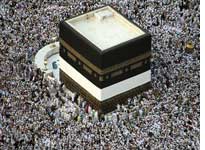Baithak World Apr 27: Malawi, Egyptian View, Israeli Take, Western Media, Lighght Verse, Catastrophist, Neoconner, Haj, Wrong kind of Muslim, Pope...
Prior to planning once more the course of the railway between Haifa and Damascus, and before Israeli developers start searching for land on which to build shopping malls in Aleppo - one should feel free to be a little insulted. Why did Israelis need to hear about their prime minister's intentions to relinquish the Golan Heights from the Syrian media, Syrian cabinet ministers and the Syrian President? Why didn't Ehud Olmert screw up his courage during one of the thousands of interviews he gave for the holiday and inform Israelis that he had told Egypt's President Bashar Assad that he intended to withdraw from the Golan? Did he think he could write a little note - "O.K., take the heights" - and transmit it through the Turkish mediator to Assad and that everything would remain secret? Assad will tell you what's happening
In “The Second Plane,” his collection of noisy, knowing writings about theocracy and terror, Martin Amis goes out on a limb. He denounces both. Really, he does. He hates Islamism and he hates Islamist murder. And so he should: if certain forms of evil are not hated, then they have not been fully understood. Amis enjoys the moral element in contempt, and he is splendidly unperturbed by the prospect of giving offense. But he appears to believe that an insult is an analysis. He wants us to remember, about the Islamists in Britain, “their six-liter plastic tubs of hairdressing bleach and nail-polish remover, their crystalline triacetone triperoxide and chapatti flour.” He knows for a fact that Islamists “habitually” jump red lights, so as “to show contempt for the law of the land (and contempt for reason).” Iranians, he teaches, are “mystical, volatile and masochistic.” Amis seems to regard his little curses as almost military contributions to the struggle. He has a hot, heroic view of himself. He writes as if he, with his wrinkled copies of Bernard Lewis and Philip Larkin, is what stands between us and the restoration of the caliphate. He is not only outraged by Sept. 11, he is also excited by it. “If Sept. 11 had to happen, then I am not at all sorry that it happened in my lifetime.” Don’t you see? It no longer matters that we missed the Spanish Civil War. ¡No pasarán! The Catastrophist - Leon Wieseltier
In 2007, a whopping 400,000 books were published or distributed in the United States, up from 300,000 in 2006, according to the industry tracker Bowker, which attributed the sharp rise to the number of print-on-demand books and reprints of out-of-print titles. University writing programs are thriving, while writers’ conferences abound, offering aspiring authors a chance to network and “workshop” their work. The blog tracker Technorati estimates that 175,000 new blogs are created worldwide each day (with a lucky few bloggers getting book deals). And the same N.E.A. study found that 7 percent of adults polled, or 15 million people, did creative writing, mostly “for personal fulfillment.” In short, everyone has a story — and everyone wants to tell it. Fewer people may be reading, but everywhere you turn, Americans are sounding their barbaric yawps over the roofs of the world, as good old Walt Whitman, himself a self-published author, once put it. You’re an Author? Me Too! - Rachel Donadio
 Muslim pilgrims in the holy city of Mecca
Muslim pilgrims in the holy city of MeccaLast December, more than 2 million Muslims from around the world converged on Saudi Arabia to participate in the Hajj, the annual pilgrimage to the holy site of Mecca. The Hajjis spent a month performing religious rituals, mingling with Muslims from all walks of life, and, in some cases, taking part in communal chants of "Death to America" led by Islamic extremists. This was understandably unnerving to the 10,000 or so Americans who made the pilgrimage, not to mention those who didn't. Such behavior raised concerns that the Hajj is a breeding ground for anti-Western sentiment—or worse.
Then again, the spirit of friendship and community that typically prevails during the Hajj has also been known to promote tolerance and understanding across peoples. Malcolm X famously softened his views on black-white relations during his pilgrimage to Mecca, where he witnessed a "spirit of unity and brotherhood that my experiences in America had led me to believe never could exist between the white and non-white."
So does the Hajj open minds, or does it expose Muslims to radical views that unite them against the non-Islamic world? To find out, researchers David Clingingsmith, Asim Khwaja, and Michael Kremer surveyed more than 1,600 Pakistanis, about half of whom went on the Hajj in 2006. In a recent, as yet unpublished study, they report that those who went to Mecca came back with more moderate views on a range of issues, both religious and nonreligious, suggesting that the Hajj may be helpful in curbing the spread of extremism in the Islamic world. Does going to Mecca make Muslims more moderate? By Ray Fisman
Headlines
U.S. fumes after Israeli envoy to UN envoy brands Carter 'a bigot'
[We can call him names - You cannot]
Paul Jay presents RealNews
|



0 Comments:
Post a Comment
<< Home